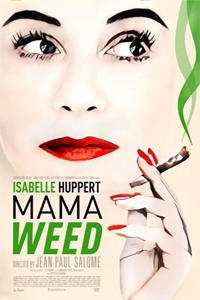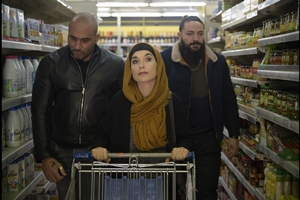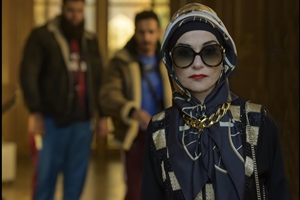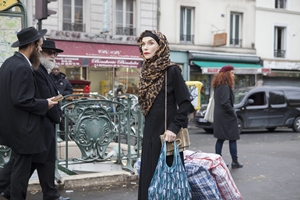Canada: Friday, March 05, 2021
Music Box Films
A French-Arabic translator for the Paris police anti-narcotics unit, Patience Portefeux interprets the daily calls and conversations between the city's biggest drug dealers. In the evenings, she looks in on her aging mother at the long-term care facility where she is months behind in paying the bills. When she overhears the son of one of her mother's nurses on the wiretap, Patience is moved to protect him. But her involvement in his business quickly escalates and she finds herself in possession of a huge store of hash and the insider knowledge required to move it. With her newly adopted retired police dog at her side, Patience transforms into Mama Weed, a savvy saleswoman capitalizing on her field experience to earn the extra income she so desperately needs.
Cast & Crew
Movie Cast
Movie Crew
User Reviews
Public Reviews - 1 Reviews
-
Gregory M. - Rated it 3 out of 5
"Mama Weed" Patience Portefeux (Isabelle Huppert) is a 'French-Arabic' police translator, specialized in phone tapping for the anti-narcotics unit. The job is tough and low-paid, but the commander Brie (Michael Louchart) is charming. One day, whilst listening to wanted drug dealers, she discovers one of them is Philippe (Hippolyte Girardot) the son of the fantastic woman Khadija (Farida Quchani), who takes care of her mother (Liliane Rovère). She decides to protect him and is brought in the middle of a drug network. When she gets her hands on a huge load of hash, with the help of her new partner Scotch (Radid Guellaz), the former police dog 'DNA', she seizes the opportunity and becomes 'Mama Weed', drug wholesaler, thanks to her field experience, and all the information she gets in her job! It's a lovely portrait of a woman. We imagine the contrast between her and her somewhat frail stature, and this tough man’s world of cops and dealers who drive 'Porsche Cayennes', and the irreverent way she treats them. Patience’s past is more developed in the book; her childhood, her father’s dealings, some flashbacks, but the narrative is very complicated. The memories infuses the character in a more underground way. The personal story of Patience’s parents is a romanticized vision of her own parents. When, for example, after office drinks organized by the police, she rails against the dealers who are sent on radicalization programs for three grams of hash, that’s something she might have said. She invents the crime thriller side of the story based on what she observed as a criminal lawyer, having defended quite a few dealers. For 'The North African Community', it's often the same two or three interpreters who handled all the cases, including those involving terrorism. It's even a bit scary. There's no cross-checking, no one verified the translation of the wire taps. If someone ill-intentioned translated incorrectly for their own ends, no one would know. That’s not exactly the case with Patience. She mainly wants to help the nurse Fatou (Jeanne Deprez), who's providing a relatively happy end to her life by showing her the affection that she, her own daughter Hortense (Iris Bry), is not able to give. But once the drugs are on the loose, why not go and get them? That explains why Patience is worried about her future. For example, for the scene where Madame Fo (Jade Nadja Nguyen) and Patience talk about how to launder money, she wants to be sure she’d understand the mechanism. Once you’ve settled on the final form of things, it’s then all about implementing that. You've to find the right pace, the right timing for her and her partners. Patience lies a lot, to everyone, to preserve her double life. In a way, you dominate your world when you lie, it’s a sort of power Patience has over people. She frees herself from what’s holding her back. She throws off what has been weighing on her for years. She inherited debt from her husband who, like his parents, was dabbling in some rather shady business. She finds a stable job, but which didn’t pay very well. And then this opportunity presented itself. This is the story of a woman who decides not to mourn, and to find part of her lost paradise. It’s a shame, the character could have some flashes of lucidity and work her way into the conversation, but she’d comments on the scraps of conversation she overheard, like; 'Who’s going to prison?' Patience didn’t become 'The Daronne' just to pay her debts. The lead character plunges into an adventure which makes her become complicit and adversarial. Complicit, because everything begins with this friendship with the nurse who looks after her mother. Adversarial, because she sucks as much money as possible from the woman she tricks. Lightness and melancholy combined, a kind of solitude too. For this character, the romantic does not rule out solitude. Nor courage. She’s not afraid to venture where she goes. She’s a woman who underwent a brutal bereavement. She doesn’t ask herself too many questions when this unexpected windfall arrives. She throws herself into the venture, she's amoral almost without knowing it. And then she breaks free. But deep down, less for a new life than to regain a lost magnificence, to return to a previous lifestyle. The weight of the past infuses the narrative in a subtle, allusive way. That gives a kind of poetry to the character. No psychology, no constructing the character. But there has to be some substance, some depth, so the film gives some explanation to the spectator, in a discreet way. Philippe is more in the background in the original text. He didn’t see anything, she totally manipulated him. On screen, he might have looked like an absolute cretin! It's also lacking some elements of danger. The film develops a double jeopardy, that of. The character is more rooted, and that he helps to anchor this rather crazy story in a certain normality. He has authority that stems from his position as a captain in the drug squad, but he’s also a rather spaced out, gentle character. His good nature means one could think he allows himself to be manipulated. He clearly wants to start over with a new life. 'The Cherkaoui' brothers Biscotte (Raf (Bessqoud) and Chacapic (Mourad Boudaoud) on the one hand, and the police during a deal in Barbès on the other. Even from a point of view of credibility, it’s difficult to sell a ton and a half of hash in Paris without anyone asking where it comes from. 'The Cherkaoui' brothers are mainly very threatening. They're the stooges and the film gently mocks them, without caricaturing them. But the script is more or less faithful. "Mama Weed" is based on 'La Daronne' by Hannelore Cayre. 'La Daronne' is a subject Claude Chabrol would have liked. It contains all the ingredients for a satire, but, as much in the book as in the film, one never loses sight of a sort of humanism. The film starts like a thriller, then veers into comedy, then gradually becomes the portrait of a woman full of emotion. The accuracy of observation of this world of big.and small-time dealers, and also the shopkeepers, some of them 'Chinese' immigrants, who are the victims of trafficking or who've been roughed up by thugs. The film’s veracity is also closely linked to it's portrayal of contemporary Paris. The little hotel where the dealers are arrested is just two blocks away at Couronnes, and the old people’s home is close by. The film looks for some higher points of view to see Paris differently, like 'The Eiffel Tower' seen from 'The Rue De Ménilmontant', a shot looking down on 'The Hôtel-Dieu' or the new law courts complex, to show the city before plunging into it. It's important to film the Paris of today and the neighborhoods around 'Belleville' and 'Ménilmontant', which you don’t see so much in 'French' cinema. Various communities live alongside each other there, like 'The Wenzhou Community' which has taken over quite a few shops, but there are also 'North Africans', 'Orthodox Jews', etc. This melting pot, which seems natural in American films, appears on screen, notably among the extras, without any caricature. What works well in the film is going against archetypes, portraying strength from a position of fragility, portraying trickery from a position of candor; that’s what’s amusing. written by Gregory Mann



